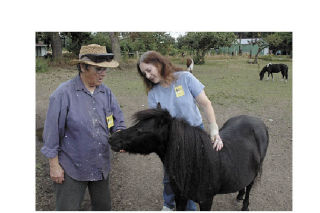TULALIP — Yes, of course, association officials talked about the work the organization does in rescuing unwanted and often abused or neglected horses.
Founded in 1997, the Equine Rescue Association also accepts and trains volunteers, mostly teens and young adults. They offer low-cost riding classes to youngsters and even mother and child programs in which the young students learn on ponies.
“I don’t know of another venue that has as much room for growth and experience,” said association director Vell Moore, a retired college professor with degrees in public recreation.
“The kids just learn so much about compassion and responsibility,” said Suzette Acey, vice-president of the association board. “There are some valuable insights to be gained from caring for horses.”
The 30 or so animals usually housed by the Equine Rescue group certainly are in need of some tender care. Moore can rattle off stories about various animals, mostly older animals in horse years, taken in by her group. She said one lonely horse spent the first three or four weeks at Equine Rescue almost constantly calling out to other animals.
Moore also mentioned caring for horses with sores on their feet from being left standing in pastures and not being cleaned or properly shoed. Some animals have far more serious medical problems.
A couple of association horses are former racing horses whose owners just decided they didn’t want them anymore when the animals’ racing days ended for whatever reason. The association also has at least one former performing horse.
“For them, it’s like going from Wall Street to Tijuana,” Moore said of the racing or performing horses who got used to having the best care, the best food.
“Of course they don’t have feelings like we do, but they do get depressed,” Moore added.
She also said the former racers and performers are extremely well trained, giving those learning to ride and handle the animals great examples of what a good horse can be.
Moore insists the association is one of a few, if not the only spot locally, where youngsters interested in horses can come and learn to handle and ride the animals for a low cost.
“There’s very few other opportunities out there,” Acey agreed.
She became involved with the organization when looking for a spot to retire her daughter’s horse.
“He was a great horse,” Becky Acey, 17, said of Saint, who has since passed away. Now a volunteer for the Equine Association, Becky talked about riding Saint in jumping and other competitions. But she added the animal simply became too old and was facing some physical issues.
Suzette Acey said she and her family looked at a couple of different spots for Saint.
“I saw how much attention, how much one-on-one care the horses receive here,” Acey said. “We just decided this was the best place for her to retire.”
Becky said when she had to complete a few hours of community service to satisfy some school requirements, she quickly thought of the Equine Association. Those 15 hours of required service turned into years of volunteering.
“I just ended up loving it,” she said. “And I have no plans on stopping. It’s just worked out perfectly.”
Moore isn’t shy about talking about the financial and support issues she has faced in running the Equine Association. Unlike many others animals, such as dogs and cats, she noted there are no state or county programs to help care for unwanted or neglected horses.
“But they made me want to commit to this because they are such good creatures,” she said.
The association has had a few different homes before landing last year at property on 116th Street NE, property owned by the Marysville School District. The district used to utilize the land for a now discontinued agricultural program. A district official happened to drive by the property one day, then heard the Equine group was looking for a new home. Moore said he quickly put two and two together and the group began leasing the space at a low cost.
“That is exactly how it happened,” Moore said, adding volunteers did plenty of work turning the property into something suitable for horses. For example, a former pig barn had to be converted to a pony barn.
As for the cost of keeping the horses, that price tag currently sits at about $5,000 per animal. Moore claimed the cost of boarding horses has more than doubled in the last five years. While they have tried to write a few grant applications, they rely on donations, the few dollars raised by offering riding classes and, of course, the work of their volunteers.
The group plans a major golf-outing, fundraiser at
1 p.m., Oct. 11 at CedarCrest Golf Course in Marysville. The group is looking for golfers and team sponsors. They will be offering a dinner buffet, for which separate tickets are available, along with an auction for donated items.
For more information, go to www.golfdigestplanner.com/5604-HorseRescue or call Acey at 425-870-1761. You also may visit the Equine Rescue Association Web site at www.era-horsehaven.org.



